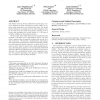Free Online Productivity Tools
i2Speak
i2Symbol
i2OCR
iTex2Img
iWeb2Print
iWeb2Shot
i2Type
iPdf2Split
iPdf2Merge
i2Bopomofo
i2Arabic
i2Style
i2Image
i2PDF
iLatex2Rtf
Sci2ools
108
click to vote
PODC
2004
ACM
2004
ACM
Mechanism design for policy routing
The Border Gateway Protocol (BGP) for interdomain routing is designed to allow autonomous systems (ASes) to express policy preferences over alternative routes. We model these preferences as arising from an AS’s underlying utility for each route and study the problem of finding a set of routes that maximizes the overall welfare (i.e., the sum of all ASes’ utilities for their selected routes). We show that, if the utility functions are unrestricted, this problem is NP-hard even to approximate closely. We then study a natural class of restricted utilities that we call nexthop preferences. We present a strategyproof, polynomialtime computable mechanism for welfare-maximizing routing over this restricted domain. However, we show that, in contrast to earlier work on lowest-cost routing mechanism design, this mechanism appears to be incompatible with BGP and hence difficult to implement in the context of the current Internet. Our contributions include a new complexity measure for Intern...
Related Content
| Added | 30 Jun 2010 |
| Updated | 30 Jun 2010 |
| Type | Conference |
| Year | 2004 |
| Where | PODC |
| Authors | Joan Feigenbaum, Rahul Sami, Scott Shenker |
Comments (0)

